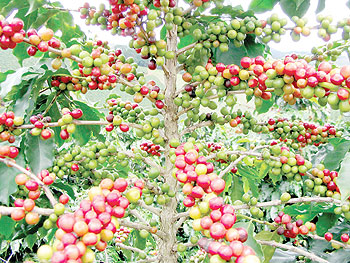The National Agriculture Export Development Board (NAEB) is set to establish a coffee roasting plant as part of government’s strategy to raise farmers’ earnings and boost coffee exports by adding value to the crop. The Rwf700m plant will be put up through a Public Private Partnership (PPP), with Ocir-Café holding 49 per cent stake in the project while private operator, Clinton Hunter Development Initiative, will hold 51 per cent shares.


The National Agriculture Export Development Board (NAEB) is set to establish a coffee roasting plant as part of government’s strategy to raise farmers’ earnings and boost coffee exports by adding value to the crop.
The Rwf700m plant will be put up through a Public Private Partnership (PPP), with Ocir-Café holding 49 per cent stake in the project while private operator, Clinton Hunter Development Initiative, will hold 51 per cent shares.
Alex Kanyankole, the Director General of NAEB said they are yet to acquire a construction permit. Real Contractors has been hired to carryout the construction, which will last between six and eight months.
"This plant is aimed at the premium end of the market and will complement other products in the coffee export chain but it will be priced higher than our green coffee beans,” Kanyankole said.
Rwanda mainly exports traditional coffee beans, which currently attracts US$6 per kilo on the international market, US$14 less the price of roasted coffee.
The plant will have the capacity to roast 3,000 metric tones annually. Rwanda targets the Middle East, regional markets and the US for her roasted coffee exports.
This year, government targets US $60m from coffee exports, up from US $47m last year.
"The plant will positively impact the community by rising personal incomes and accelerating economic growth,” Kanyankore said.
Currently, coffee roasters include, Bourbon, Ocir Café and Nkubiri Enterprise that roast between 10 and 20 metric tonnes per year.
Innocent Uwimana, Director of Clinton Hunter Development in Rwanda said the planned coffee roasting plant suits the objective of foundation to improve lives through business.
"The income to be generated from the plant is expected to improve lives through price bonuses to coffee farmers,” Uwimana said.
Jean Bosco Seminega, the Executive Secretary of Coffee Association Board said that the roasting plant is an additional market for local produce.
"Our clients are still interested in fresh green coffee but the plant is a good opportunity for our product,” Seminega said.
The association operates with different coffee exporters including cooperatives and individuals exporting between 18 and 20 tonnes per year.
He however, cautioned that roasted coffee would be old by the time it hits the market if shipped unless there is flight cargo.
Meanwhile, Nestle International has also expressed interest in setting up a plant and studies to determine the type of plant and the sector of operations are ongoing.
Nestle also manufactures powdered and liquid milk, malted drinks, instant foods, and chocolate.
In a bid to improve exports, the government designed the National Export Promotion Strategy which was adopted this year to mobilise stakeholders to accelerate export growth.
The strategy also aims at addressing bottlenecks to make local products more competitive both locally and for export.
Coffee is among the priority traditional sectors for the next five years. Others include tea, tourism and mining as well as emerging non-traditional export sectors of horticulture and business process outsourcing.
Ends


